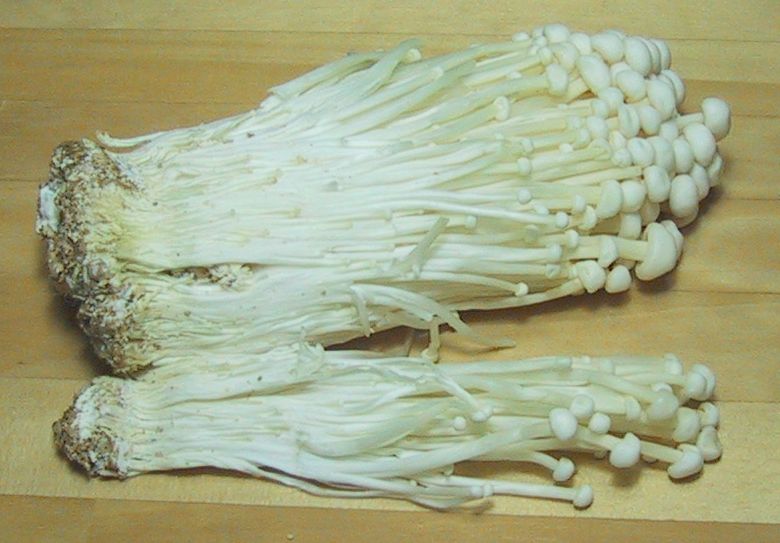First up was rolls. I had meant to pick up some won-ton wrappers at the local market (Victoria is extremely lucky in that we have both a large Asian community and a local grocery chain that caters to them. This means access to a lot of items that are more difficult to find in the majors—like the black-skinned Silky chickens that are the breed used in traditional Chinese cooking). Instead of buying the won-ton wrappers, I found egg roll wrappers. The ingredient list was short (five items, only one of which was a preservative), and they were cheap (around two bucks), and they had a suggested use recipe on the front. So, I was sold.
So, lunch was pretty simple. Ground pork, spiced and flavoured, fried up. Added rice flour to thicken the juices. Flipped it out onto a plate. Put the skillet back on the stove and added about 25mm of (GM free) canola oil and let it heat. Peeled a wrap off the stack, wet the edges with a flour/water paste, and began building. I kept it pretty simple; spiced meat, enoki mushrooms, and bean sprouts.
 |
| Enoki Mushrooms--Photo by Chris 73 / Wikimedia Commons |
Created the roll (following the folding instructions on the package, but really, it is pretty straightforward), slipped it into the hot oil, and went back to make another. Apparently I heated the oil just right. As I put one in, the previous roll was ready for flipping or removal. No smoke, no excessive browning. Just nice, crisp, deep-fried rolls.
With lunch under our belts (and the rolls were good enough that it was difficult to stop eating them, so the belt was a bit strained), my next chore was poaching tongue. I had bought two pork tongues Friday, and, on getting them home, put them in brine for about twenty-four hours as per my guru of nose-to-tail eating, Jennifer McLagan.
 |
| Odd Bits cover from Jennifer McLagan |
I'm a big fan of Jennifer McLagan, as I've said before. Her three books, Bones, Fat, and Odd Bits, form a superb guide to under-appreciated or forgotten ingredients in the kitchen. I've rendered lard according to her direction, roasted marrow bones, and now, prepared tongue. In the kitchen, I like to follow a recipe as accurately as possible the first time through, to discover what the author had in mind. If I like it, great. If not, but I see potential, then I'll cheerfully alter the ingredients, cooking times, or whatever. So Sunday found me putting together a poaching liquid the way JM detailed it.
Poaching Liquid from Odd Bits:
(this is recommended for 2.25-3.3 pounds / 1.0 to 1.5 kilos of Beef tongue or lamb's tongues, brined)
1 small onion, quartered
2 cloves
I carrot, peeled and chopped
2 stalks celery, sliced
6 black peppercorns
6 allspice berries
3 stems flat-leaf parsley
1 clove garlic
1 large sprig thyme
1 fresh bay leaf
Okay, so I wasn't perfect. I used a couple of dried bay leaves instead of a fresh one. But still.... So following JM's instructions, I brought the liquid up to the boil and then dropped it to a simmer. JM says to simmer for 1 ½ to 2½ hours until the tongue is very tender. JM warns that once you take the tongue out of the poaching liquid, you should immediately begin taking the skin off of it, not waiting until it cools. As per her instructions, I donned rubber gloves and pulled the first tongue out. And the skin pretty much fell off. I thought, “Well, this is going to be easy.” And about 80% of it was easy. I was, though, occasionally reduced to using the back of my knife to convince bits of skin to let loose, or flip up so that my gloved fingers could grab it. And by the time I was finished, the tongues were not ready to have their photograph taken. To be honest, they were both a bit battered. So the end result wasn't all that pretty. But, and this is an important but, it tasted pretty darned good. JM quotes Stephanie Alexander saying:
Some recoil in horror when faced with the physical reality of a calf's, ox or lamb's tongue. There is absolutely no doubt what it is, whereas these cooks may not realize that a chop is in fact one of the ribs of a lamb! If you can get past this prejudice, you will find that tongue is delicate in flavour, soft and melting of texture when served hot and smooth and creamy when cold.As per instruction, I slipped the skinned tongue back into the strained poaching liquid and left it to cool. The piece I sampled before doing so was mildly flavoured and not at all the gristly knob I had originally expected. At least one of the tongues I prepared will go into a hash, with potatoes and eggs, for breakfast. This exploration into preparing tongue went well enough that the next time I'm up-Island in Duncan, I'll stop at the butcher for lamb tongue. Beef tongue is available locally, but at a heck of a price: $10-$15 each. The pork tongue was a lot cheaper, with the two I prepared costing me about $3.50. And no waste: the dog we care for was thrilled to be offered the bits of skin I peeled. And was quite disappointed that there wasn't more.
No comments:
Post a Comment